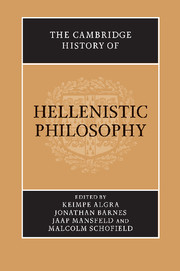Book contents
- Frontmatter
- PART I INTRODUCTION
- PART II LOGIC AND LANGUAGE
- PART III EPISTEMOLOGY
- PART IV PHYSICS AND METAPHYSICS
- PART V ETHICS AND POLITICS
- 19 The Socratic legacy
- 20 Epicurean ethics
- 21 Stoic ethics
- 22 Social and political thought
- Epilogue
- Synopsis of principal events
- Editions of sources and fragments
- List of abbreviations
- Bibliography
- Index locorum
- General Index
- References
21 - Stoic ethics
from PART V - ETHICS AND POLITICS
Published online by Cambridge University Press: 28 March 2008
- Frontmatter
- PART I INTRODUCTION
- PART II LOGIC AND LANGUAGE
- PART III EPISTEMOLOGY
- PART IV PHYSICS AND METAPHYSICS
- PART V ETHICS AND POLITICS
- 19 The Socratic legacy
- 20 Epicurean ethics
- 21 Stoic ethics
- 22 Social and political thought
- Epilogue
- Synopsis of principal events
- Editions of sources and fragments
- List of abbreviations
- Bibliography
- Index locorum
- General Index
- References
Summary
Foundations and first principles
Stoic ethics starts from foundations and first principles which are more explicit than those of most ancient ethical systems. Chrysippus announced in his Propositions in Physics that ‘there is no other or more fitting way to tackle the theory of good and bad things, the virtues, and happiness than on the basis of nature as a whole and the administration of the cosmos’ (Plu. De Stoicis In Platonis Rempublicam commentarii 1035c). This explicit statement about starting points puts the emphasis on nature in the cosmic sense, i.e. the nature of the entire providentially governed cosmos; but elsewhere Chrysippus turns to a more inclusive sense of nature: when he says ‘Where should I begin from and what should I take as the starting point for the appropriate and as the raw material for virtue, if I skip over nature and what accords with nature?’ (Plu. De communibus notitiis adversus Stoicos. 1069e), it is clear that the nature in question is not just cosmic. Crucial ethical concepts also find their roots in the nature of humans and in theories about what accords with human nature.
The central importance of human nature clearly goes back to the founder of the school. In the list of titles given by Diogenes Laertius (VII.4) we find a treatise On the life according to nature and one On impulse, also titled On human nature. But we have no record of an On goals or On virtue; indeed, the main evidence given for Zeno's views on the telos is the work On human nature (D.L. VII.87). Whatever the rôle of human as opposed to cosmic nature in Zeno's thinking, it is striking that the major ethical treatises (aside from the Republic) suggest a strong interest in the former.
- Type
- Chapter
- Information
- The Cambridge History of Hellenistic Philosophy , pp. 675 - 738Publisher: Cambridge University PressPrint publication year: 1999
References
- 59
- Cited by

